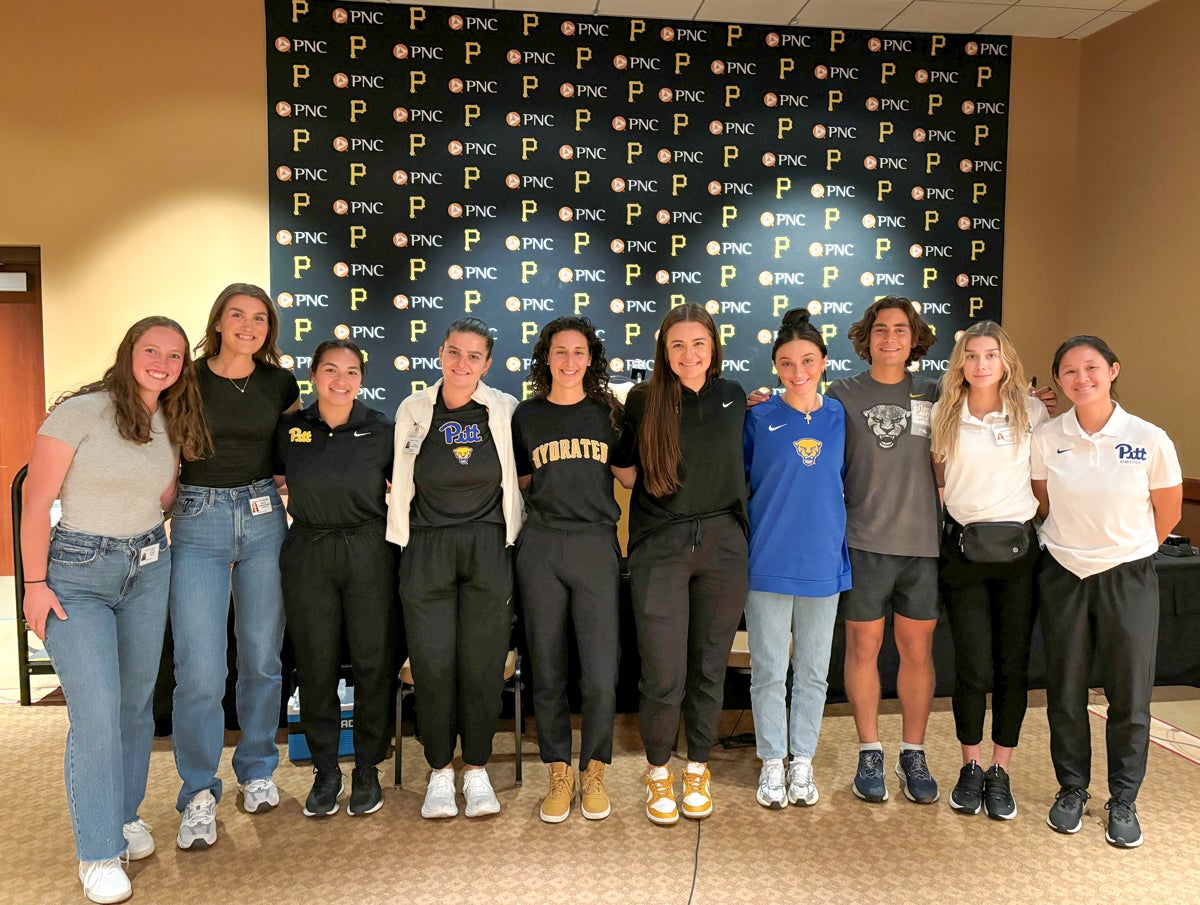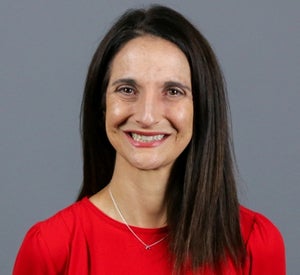Mia Huber joined the University of Pittsburgh Dietitian Nutritionist (DN) program in 2023 through the post-baccalaureate pathway after acquiring her Bachelor of Science in exercise science from Slippery Rock University. Now in her third and final year of the program, Huber will begin her required supervised experiential learning in the Sports Nutrition specialty rotation.
The DN program requires students to complete the majority of their supervised experiential learning during their final year in the program, which can include a 12-week rotation in a specialized area of nutrition. With an interest in sports nutrition, Huber began volunteering with Pitt Athletics in 2023. With her unique perspective of nutrition from her post-baccalaureate pathway and her experience with Pitt Athletics, Huber was selected for placement in the competitive Sports Nutrition specialty rotation, where she will work directly with student athletes on nutrition education.
Read more to learn about Huber’s experience in the program thus far and what she is looking forward to when beginning her rotation.
The Sports Nutrition Specialty
What made you want to study in the Sports Nutrition specialty?
I am drawn to sports nutrition because of my fascination surrounding nutrition science and my passion for health and fitness. Athletics has been an integral part of my life since I was young. I grew up playing team sports, which taught me collaboration and commitment. I believe small, consistent changes in lifestyle can lead to significant improvements in health, performance, and mindset over time. When it comes to sports nutrition, I see it more like the secret sauce—not the main ingredient, but a key component that can give athletes an extra edge. What excites me most as a future dietitian is encouraging athletes to make smart nutritional choices that help them accomplish their performance goals and ultimately transform their well-being.
What sets this Pitt DN program apart from others?
Not only does the faculty set the DN program apart from others, but the specialty rotations and opportunities I’ve experienced the past two years do as well! All the professors and staff truly want what’s best for the students and create as many opportunities as possible for us to succeed in our academics and future careers. While our program is small, there are stronger connections and networking among students, faculty and alumni, which create a more supportive and collaborative environment.

Another element that sets the SHRS DN program apart from others is the numerous sports nutrition opportunities I have been offered during the past two years, which I am very grateful for. It was a privilege to travel to Detroit, Michigan, to fuel and support the Pitt football team playing in the GameAbove Sports Bowl in December 2024. I learned so much over the course of the trip. Another great experience was when we were invited to a Pirates game last season. A small group of my cohort interested in sports nutrition had the chance to watch batting practice before the game, followed by a Q&A panel with the two sports dietitians working for the Pirates. We concluded the event by watching the Pirates win against the Miami Marlins on a beautiful sunny evening at PNC Park.
What will your role be in the Sports Nutrition specialty with Pitt Athletics?
Although I have not started my Sports Nutrition specialty yet, I envision the collaboration with Pitt Athletics will expand my knowledge and challenge my perspective. I believe in a client-centered approach which involves interdisciplinary teamwork. Pitt Athletics and the Sports Nutrition team offer valuable resources to student-athletes, such as providing access to the team dietitian, athletic trainers, physical therapists, strength and conditioning coaches, counselors and other support staff. Interdisciplinary teamwork involves many individuals working together to contribute to an athlete’s development and achievement. I am looking forward to networking with other sports professionals who will enrich my experience as a third-year sports nutrition intern.
How will you use what you learned thus far in this specialty?
Sports nutrition has its weekly tasks like any other job, but it is also quite unpredictable in completing day-to-day responsibilities. I have learned to be quick on my feet, ready to always problem solve. Since the athletes are always the priority, setting them up for success is the goal each day, despite twists and turns which are often out of our control. Moreover, nutrition can often be misunderstood—there are several myths to debunk. Actionable, yet practical nutrition education will be better received by an athlete than explaining science terminology I’ve learned from any textbook. Registered Dietitians (RDN) are nutrition experts; it’s part of their job to disseminate evidenced-based research appropriately while supporting the athlete and their sport.
Gaining Experience with Pitt Athletes
What is beneficial about working with athletes directly?
Athletes want to succeed in their sport. Interacting with them directly gives me the opportunity to be a small part of their success! I also enjoy getting to know the athletes more, in addition to their role as a competitor. Working alongside athletes, I gain insight into their hobbies, favorite snacks and academic interests.

Will you work with coaches or anyone besides the athletes?
Yes, I believe teamwork truly makes the dream work. I have associated with various coaches, athletic trainers, physical therapists, food service or equipment staff and occasionally sports medicine doctors. We should refer to other knowledgeable professionals when an athlete is facing a challenging circumstance. Such situations may include making decisions about injuries, medical treatment or aligning nutrition advice and meal planning with their training schedules, whether in-season or during the off-season.
Do you aspire to work in sports nutrition after graduation?
Yes! I am open to working with any sport after graduation. I’m not sure whether I will want to stay within collegiate athletics or perhaps work with professional athletes in the future; however, I am excited to gain more practical experience with Pitt Athletics at either Pitt Football or Olympic Sports during my Sports Nutrition rotation next spring semester!
What is something fun you have learned about athletes and their nutrition?
Athletes definitely have their own food and flavor preferences, and I’ve even noticed favorite team snacks can vary as well. At Pitt, student-athletes often choose snacks that support their performance goals and align with the demands of their sport. For instance, a pre-practice snack for volleyball players typically consists of quick carbohydrates like a fruit cup or applesauce, while wrestlers tend to gravitate toward high-protein options like tuna packets or hard-boiled eggs. Among most athletes, Smucker’s Uncrustables are a favorite snack after practice, because they provide both carbohydrates and protein!
Related Stories

Learn more about the collaboration between the Dietitian Nutritionist program and Pitt Athletics, featuring Auburn Paulone, assistant director for performance nutrition at Pitt Athletics and Tracy Maluchnik, SHRS assistant professor within the Dietitian Nutritionist program and clinical instructor for the Sports Nutrition specialty rotation.

Read about Dietitian Nutritionist student Nicole Chiu’s experience with Pitt Athletics as she prepares for her Sports Nutrition specialty rotation.

Read about Dietitian Nutritionist student Nick Sage’s journey through the SHRS Nutrition Science and Sports Science programs and how they led him to the Sports Nutrition specialty rotation to become a sports dietitian.


